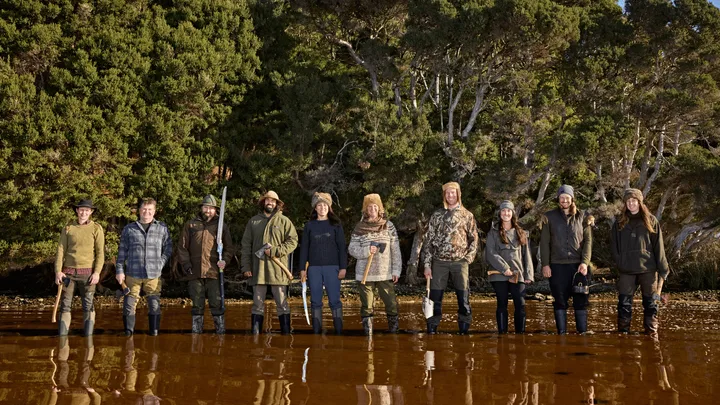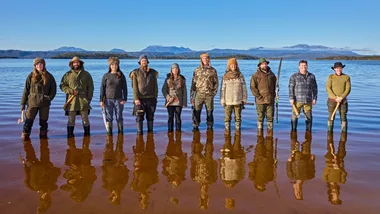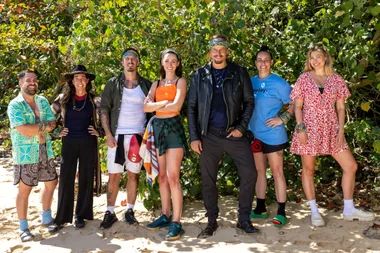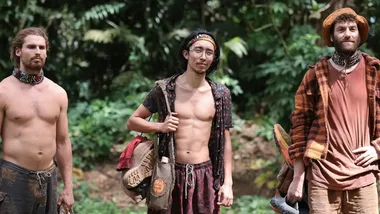Alone Australia has returned for its third season, and we are back in Tasmania/Lutriwita. But not everyone can surmount the challenge of solitude and survival. Here’s who has left Alone Australia and who is still in it to win the grand prize.
Ten survivalists from various backgrounds have put themselves forward for this ultimate survivor challenge. Already, we have seen tremendous displays of their skills from shelter building to fishing (no bow hunting here).
However, not everyone has what it takes to stay alone. Read on to find out who has tapped out thus far this season in 2025.
Alone Australia airs on SBS on Wednesdays from 7.30pm and is available to stream on SBS on Demand.
SPOILERS AHEAD!
Who has left Alone Australia 2025?

Tom Covell, 33
Ecologist
After 47 gruelling days in the Tasmanian wilderness — including four days without food and enduring weeks of rain and a perpetually wet, muddy shelter — Tom finally made the difficult decision to tap out.
Throughout his time on Alone Australia, Tom successfully caught five trout and set traps, even capturing the attention of a curious quoll on day 36, much to the delight of the ecologist. Yet, the harsh conditions were relentless.
By day 46, during a routine medical check, the medical team discovered Tom had lost 21 kilos since arriving. He reported feeling lightheaded when standing and had previously reported numbness and the beginning of frostbite in his right arm. Despite showing signs of starvation, the doctors deemed him technically fit to continue, but the toll on his body was undeniable. The next day, Tom decided it was time to go home.
“This place has humbled me,” he said. He described his time on Alone Australia as the greatest challenge and an incredible adventure, but he’s ready to go home.
Born without his right hand due to symbrachydactyly — a rare condition where a person is born with short, webbed, or missing fingers — Tom has spent his life embracing challenges, from hunting and rock climbing to international adventures spanning Patagonia and Antarctica.
Before becoming a stay-at-home dad, Tom explored the world, trail running and kayaking. At home, he provides for his family with foraged foods and wild game, and also works as a zoo educator while running his own nature-focused business.
“Nature heals my hurts,” he said back on day 35. This won’t be he last adventure in the wild!

Ben Grieger, 38
English Teacher
After 40 gruelling days in Tasmania’s remote West Coast, Ben was medically evacuated due to low blood pressure and significant weight loss.
By day 37, Ben’s body was beginning to shut down. Attempting to make repairs to his shelter, he found he physically couldn’t. Instead, he nearly passed out, slumping against the shelter’s walls. In those moments of weakness, he turned to his faith to carry him through. After 40 gruelling days in Tasmania’s remote West Coast, the medical team evacuated him.
In the lead-up, Ben was noticeably slower and more unsteady, struggling with frequent stumbles. He hadn’t had any food in his shelter since day 25, and as he put it, “My body is just getting to the end of its limits.” He also reported feeling nauseous and lightheaded.
Although he’d had some success early on with fishing — catching eels and trout — that had slowed significantly. Still, Ben made his mark: he was the first person on Alone Australia to create friction fire.
On his final day, he reflected on his religious teachings, which state that Jesus also spent 40 days in isolation being tempted.
As he examines his emaciated frame, Ben remarks, “That’s pretty darn tooting skinny.”
When the medical team arrives for a check-up, they do ultimately decide to medically evacuate him. Ben reached his limit with quiet acceptance. “That’s good,” he said in response to the doctor’s decision with a sigh of relief or acceptance, it’s hard to say.
Reflecting on his journey, Ben drew strength from his faith: “I was pulled on day 40 like my lord and saviour Jesus… and it was after that he started the next chapter of his life.”
He leaves with gratitude and a renewed sense of purpose. “I have been taught how to be a better man, husband and father, and I can’t wait to put that into practice… I feel so blessed.”

Karla Pound, 35
Expedition Leader
On day 35, Karla finally called it quits.
Unfortunately, the Expedition Leader had no luck fishing or with her elboarte wallaby trap. In fact, she also endured a bout of food poisoning from foraged plants. Because of her lack of food and stimulation, her mood started to darken.
“Sitting around doing nothing is just not food for my headspace,” she shared. “I’m not good at relaxing, I’m not not good at keeping still.”
She didn’t come out for an “epiphany”, but that’s what she got anyway. This experience has made her realise that she has been neglecting her personal relationships in her busy lifestyle. With nothing to do except think and tend to her fire, she has plenty of time to assess her life.
“I do need people”, she says. “I just didn’t realise that I need people.”
And so, she decides to tap out. When the extraction team arrives, she expands on her realisation:
“This place brings out emotions in you that you don’t even know you have. I started to not feel like myself, and I didn’t like that. I’m so happy to have come to the realisation that I do need humans.”
“I don’t want to be alone anymore, here or in my real life.”

Yonke van Geloven, 52
Farmer and Permaculturalist
Yonke spent 31 days in the wild West Coast Ranges of Lutruwita/Tasmania. She didn’t leave because of hunger. It wasn’t a medical extraction. Her departure had nothing to do with what we usually expect from Alone Australia — it was something deeper.
“I love it here. It’s beautiful”
From the very beginning, Yonke expressed how much she adored being in the landscape. In episode six, she spoke of the region’s shifting moods and weather, saying it gave her a kind of nourishment she hadn’t expected.
“If we could feast with eyes alone, I would be a very full person at the moment,” she said, taking in her surroundings.
For three weeks, she survived on saw sedge, leatherwood gum, and berries. She hadn’t caught any fish, but that wasn’t what broke her spirit.
“When I came here, for me, what I really wanted was to let my wild, intuitive self run, be wild.”
On day 23, Yonke crafted a fish funnel/eel trap. It’s not as sturdy as Ceilidh’s design, but she gives it a crack. Her trap is beautiful and even has a door on its opposite end. Unfortunately, the design lacked a way to guide the eels in. Still, she placed it in the water and hoped for the best.
“Thing is, when you haven’t eaten, the last thing you want to do be doing is friggin around with cameras.”
Her relationship with the camera became strained. The filming, which all contestants must do themselves, wasn’t just inconvenient. It was interrupting the spiritual connection she came for.
By day 26, she was feeling low. She’s upset that she is missing out on what she wanted to get out of the experience: a”deep listening” with the land.
In a quiet act of rebellion, she turned off the camera for two hours, taking a “personal care day” to wash, sit nude in the sun, and clean her clothes. It was a rare, grounding moment.
By day 31, it was clear.
“I don’t love my camera. I actually rather resent the cameras… That experience I was searching for — I don’t think it’s going to happen for me here.”
Being constantly interrupted by the mechanics of filming — adjusting shots, checking batteries, talking to no one — was stealing her peace.
“It’s hard, being held back so much. It really kills my intuition.”
And so, Yonke taps out. Not because she couldn’t survive, but because she couldn’t make a “documentary” about her experience.

Ceilidh Marigold, 34
Disability Support Worker
On day 19, Ceilidh had to be medically evacuated due to an infection she likely picked up from the lake water.
It was a heartbreaking moment as Ceilidh had everything she needed to continue on, and even potentially win. She had plenty of fish in the creek nearby that she had no issue catching with her fish trap. She was warm and dry. Everything was going for her.
“I’m not ready,” she said after the medical team made their decision.
“I’m gutted that it’s ended. I feel like I just got started,’ she said. “I thought I had it.”
While packing up, Ceilidh shares that her father, who taught her much of what she knows about bushcraft and survival skills, was “there the whole time.”
“He was the eagles in the sky leading me to the creek,” she said. “He was always saying, “Just keep going, just keep trying.”‘
Despite the unfortunate ending, Ceilidh is looking forward to her next adventure with her wife. And left on a note of hope:
“Now that my time is up, I hope that I have inspired so many people, regardless of age, gender, sexuality, abbilities can do this shit. You just put your mind to it and go for it. And you don’t really lose until you actually quit trying.”
Read our interview with Ceilidh about her experience on Alone Australia here.
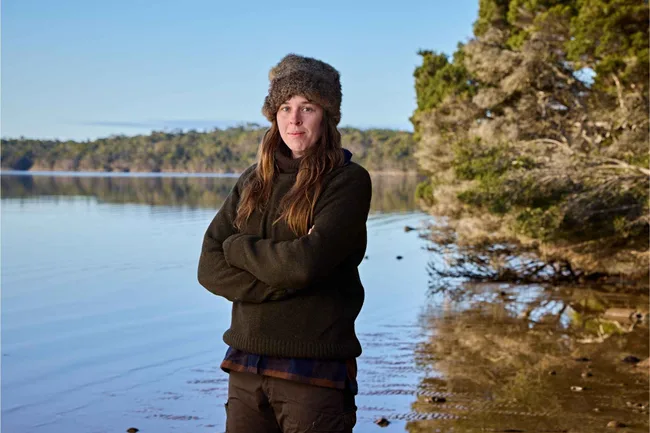
Eva Angophora, 31
Rewilding Facilitator
After 17 days, Eva voluntarily tapped out of the competition.
We started season 3 episode 4 with her celebrating her birthday with a cake made of lichen. She then headed out to the lake to attempt to catch a fish for her birthday. Unfortunately, even over two weeks into the challenge, she never had success with fishing. Her birthday was no different.
And so, Eve spent her birthday evening by her fire singing to herself and watching the stars. But hunger was looming.
The next day, she made the difficult decision to tap out.
“I don’t feel regretful, I just think I can’t push past the hunger,” she said of her decision. Later, she said she was still proud of herself for taking part in the competition and challenging herself. However, sometimes when it comes to survival, as it comes with life, luck has a big part in it.
Eve came to nature later in life and is an adept forager and highly skilled in bushcraft and fishing. Unfortunately for her, the trout just weren’t biting in her spot.

Matt Allwood, 31
Indigenous Youth Worker
Matt, a proud Yanyuwa, Waanyi/Garawa man, was the first survivalist to tap out on season three of Alone Australia.
A former professional rugby player for the Canberra Raiders and NZ Warriors, Matt was raised on a cattle station and is skilled in traditional practices such as goanna hunting, spearing stingrays, pig hunting, and shallow-water fishing.
In episode 3, after 16 days, Matt chose to leave the competition. Although he had success catching eels and his shelter was well-maintained, the emotional strain of being away from his family — wife and children, three-year-old Remy and one-year-old Lani — back in Broome proved overwhelming.
He said, “I don’t want to be crying every day,” before contacting the production team.
Reflecting on his departure, he added, “I just hope my family is proud of me and they’re not too disappointed in the short amount of time that I’ve spent here.”
